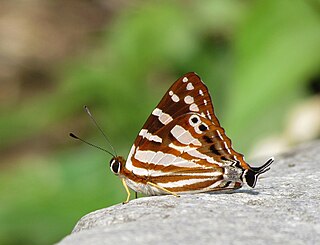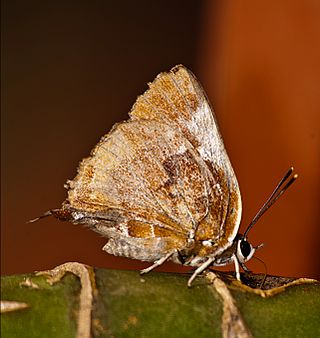
Apamea crenata, known as the clouded-bordered brindle, is a moth in the family Noctuidae. It is distributed throughout the Palearctic realm. In the North it crosses the Arctic Circle, in the Mediterranean it is found only in cool locations and mountains avoiding very hot areas. In the Alps, it rises to an altitude of about 2000 metres.

Dodona egeon, the orange Punch, is a small but striking butterfly found in the Indomalayan realm - in Mussoorie to Assam, Burma (nominate) and Peninsular Malaya that belongs to the family Riodinidae.

Curetis bulis, the bright sunbeam, is a species of butterfly belonging to the lycaenid family. It is found in Asia.

Iraota timoleon, the silverstreak blue, is a species of lycaenid or blue butterfly found in Asia.

Protorthodes mexicana is a moth in the family Noctuidae first described by J. Donald Lafontaine in 2014. It is found in Xalapa, Mexico.
Ambia albiflavalis is an African moth in the family Crambidae. It was described by George Hampson in 1917. The type locality is Nigeria.
Ambia chrysogramma is a moth in the family Crambidae. It was described by George Hampson in 1917. It is found on Samoa.
Clupeosoma astrigalis is a moth in the family Crambidae. It was described by George Hampson in 1917. It is found in Australia, where it has been recorded from Queensland.
Clupeosoma atristriata is a moth in the family Crambidae. It was described by George Hampson in 1917. It is found in Papua New Guinea, including the Bismarck Archipelago and Indonesia, where it has been recorded from Timur.
Clupeosoma rufistriata is a moth in the family Crambidae. It was described by George Hampson in 1917. It is found in New Guinea.
Apilocrocis albipunctalis is a moth in the family Crambidae. It was described by George Hampson in 1918. It is found in Ecuador and Bolivia.
Blepharomastix griseicosta is a species of moth in the family Crambidae. It was described by George Hampson in 1918. It is found in Peru.
Blepharomastix monocamptalis is a species of moth in the family Crambidae. It was described by George Hampson in 1918. It is found in Colombia.
Blepharomastix fusalis is a species of moth in the family Crambidae. It was described by George Hampson in 1917. It is found in Colombia.
Catephia pericyma is a species of moth of the family Erebidae. It is found in Egypt, Kenya, Oman, Saudi Arabia, the United Arab Emirates and Yemen.
Salbia pachyceralis is a moth in the family Crambidae. It was described by George Hampson in 1917. It is found in Panama.
Sufetula cyanolepis is a moth in the family Crambidae. It was described by George Hampson in 1912. It is found in Indonesia (Sulawesi).
Syllepte sulphureotincta is a moth in the family Crambidae. It was described by George Hampson in 1918. It is endemic to Mozambique.
Syllepte rogationis is a moth in the family Crambidae. It was described by George Hampson in 1918. It is found in Mozambique.
Ambia fulvicolor is a moth in the family Crambidae. It was described by George Hampson in 1917 and it is found in New Guinea.




